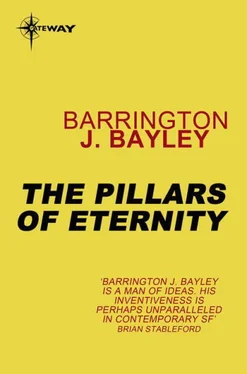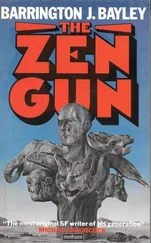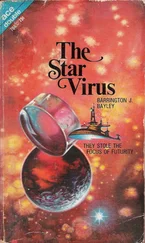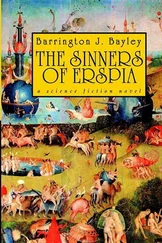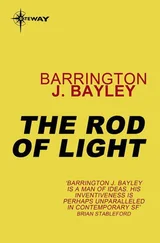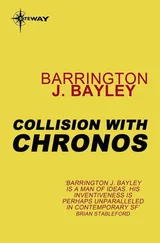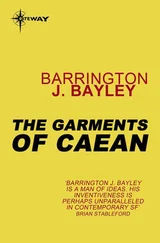It was on this point that all his hopes were pinned. He had studied all the data obtained by scientists, and all the arguments of the philosophers, and he had concluded that nothing made predestination an absolute law. It was a consequence of the strength of nature, that was all. The sheer weight of the universe, so to speak, caused events to run an identical course with each manifestation. If someone could be strong enough, or clever enough….
‘If one small detail in present time can be altered,’ he went on, ‘then eventually all will be altered. The tiniest deviation can only accumulate, until there are untold results.’ His voice shook. ‘If only somewhere in the whole vast universe, some little flower can be caused to have seven petals instead of eight! If one lone electron orbit acquires one quantum of energy more or less! Then the next manifestation of the world will not be identical to this one, and the next one will be different again. The nature of cause and effect must make it so. Then,’ he added dreamily, ‘my prison will be shattered. I shall have a chance to be spared that torment.’
‘It might mean you don’t exist at all, next time,’ Romrey ruminated.
‘Gladly, gladly!’
‘Mankind might not exist either.’
‘What does it matter? Conceivably the whole universe will never exist again. There might be just nothing, for ever and ever. Or it might take a wholly new form, in which matter itself will be different. I do not care one jot about it. All I care is that—’
Boaz halted, his fist clenched. A knowing look had come over Romrey’s face. He spread his legs so that the colonnader cards that Boaz had knocked on the floor became visible.
The cards had fallen in a mass, faces down. Only one card had separated and lay face up. Romrey bent and retrieved it. It pictured a stone tower in the instant of being shattered by a massive lightning bolt or gush of energy. From its buckling height a lone figure tumbled head first.
Romrey said sourly, ‘So we have a reading after all. This card is something of a mystery. There’s no general agreement on its meaning. Some people call it “the Universe Buster”. If that’s right, you’ve interpreted it nicely.’
Staring at the card, Boaz said, ‘It symbolizes simultaneous creation and destruction, in the colonnader deck.’
They fell silent. How Sisyphean, Boaz wondered for the thousandth time, was his task? The time-gems gave some prospect of hope – yet how often had he spent his life in this quest, only for the rock of his labours to roll back down to its resting place at his death?
In a sense, he was forced to admit that the hopelessness of his quest was the very essence of it. Its audacity, its irrational grandiosity, gave point to his existence. He pursued only because life offered no other possibility….
Romrey, meanwhile, was having thoughts of his own. He knew now, after what he had just heard, that Joachim Boaz was quite insane.
Together, without speaking, they waited for the dawn.
It came first as a glow that suffused the darkness, then as a sudden blaze. Surveying the scene through the ship’s sensors, Boaz saw at once that he had misjudged his surroundings when landing in the darkness, but he decided that the ship might as well stay put for the present. The atmosphere checked as breathable, just as previous explorers had reported – though as a different sun had then warmed the planet, the datum was not necessarily reliable.
Boaz got busy, getting together a tool kit and float sledge. ‘If you like, we’ll go together.’
Romrey nodded.
‘We’ll make a short reconnoitre to start with,’ Boaz continued. ‘As you may have guessed, there is a limit to how far I can wander from my ship. You may be useful to me in that regard.’
No mist rose from the ground to greet the burgeoning yellow sun as they descended the tread-rail. The air was perfectly clear, the landscape shining. The sky was like none either man had ever seen: it seemed to be of no single colour, but glimmered patchily, mauve, blue, pink, shot through with channels and outlines of brighter colours, like a reflection of the planet’s surface as it had appeared from space—which it probably was, thought Boaz, wondering what combination of upper atmosphere gases might bring about such a refractive trick.
But it was the ground below that held the greatest surprise. It was not ground but a floor, stretching indistinctly toward the horizon. It shone, it gleamed, it was brilliant but with a soft brilliance. It was pure yellow. As soon as they set foot on it Boaz took a cutting tool from his kit. In moments he had cut out a cavity in which yellow shadows gleamed. Wonderingly he massaged in his hands the lump he had cut. It was so malleable he could bend it where it was not too thick, needing to summon only a little strength over his integration beam.
He tested the metal with a chemical assay. Gold. Purest gold. The plain was made of it. Now that he looked close he could see that it was marked with a checkerboard of fine, barely visible etched lines.
Romrey eyed the sample without interest. Though neither of them had ever seen gold used so lavishly, it was, like every other natural element except radium and technetium, too low in value to be worth taking. What everyone now scattered around Meirjain was after was the incredibly rare, the new, the unexpected, small in bulk and huge in desirability – like time-gems….
Boaz threw aside the lump and directed Romrey’s attention to what, on landing, he had taken to be an uneven cliff wall behind them.
It was not a cliff wall. It was definitely artificial. It was a bulging, rounded hull, reddish gold in hue but studded and decorated with baroque traceries the colour of ruby, cobalt, copper and amber. The two men were too close to the gigantic structure to gain any clear idea of its nature, and Boaz gestured to Romrey to mount the float sled. Together they glided over the gold floor for a distance of about a mile.
Looking back, it was just possible to see what the ‘cliff’ was. It was, Boaz was sure, a ship, though conceivably it might have been a fixed building of fantastic shape. But what a ship! No econosphere spacedock, nor the yards of any past or present civilization in Boaz’s ken had ever constructed or planned a vessel remotely like it in size and magnificence. Its height was about a mile, but it rested lengthways on immense ornate runners, and its length was about three miles. Its form was everywhere gently rounded, though its sides, as near as Boaz could judge, were nearly parallel near the center. As the sun rose, at an angle to the horizon, the light slid along the shining bulk disclosing a richness of age, and of sheer wealth.
And that was not all. On either side of it were similar ships, forming a rank from horizon to horizon. This was a parking ground.
‘By the gods,’ Romrey muttered. ‘Just look at that. I wonder if the other people who came to the Wanderer found anything like this?’
‘There’s no saying. Most information about what was found here was suppressed. Not that there seems to have been all that much of it in the first place. They only stayed a few hours.’
‘Yeah, I know. A slingshot orbit. When they came back, Meirjain was gone and they never tracked it again – until now. Phew.’ A greedy look came over Romrey’s face. ‘We’ve got to get inside one of those things.’
‘Later, perhaps,’ frowned Boaz. He was looking in the opposite direction. Near the horizon, which was about three miles away, was a different type of structure. It looked rather like a miniature city built of purple blocks, towers and various other shapes that were indistinct at this distance. Although it could have been an industrial plant or some such artifact, it did have more of the appearance of a permanent dwelling than the monstrous vessel – although, paradoxically, it also seemed smaller.
Читать дальше
